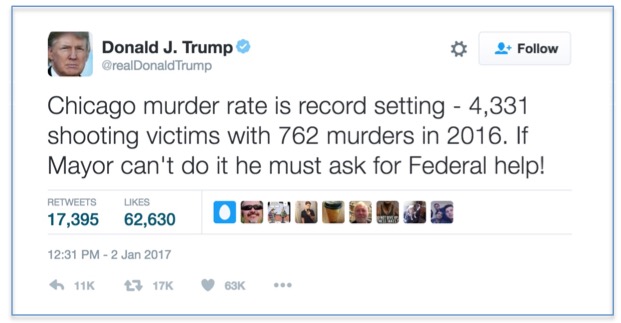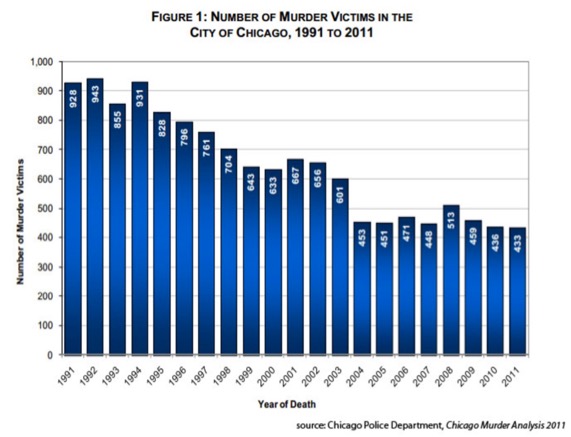“The system that you have is perfectly geared to give you what you are getting.”
-Newt Gingrich
2016 was the bloodiest year since the early 1990s in the Windy City. The Chicago Tribune reported more than 4,000 shootings and 762 homicides in 2016 (Rossberg-Douglass & Briscoe, 2017)—more than New York and Los Angeles combined (Whitaker, 2017). This is even more remarkable when you consider the relative size of each city. Chicago has a population of 2.7 million people. It’s population is roughly half the size of the state of Colorado. New York City has a population of 8.4 million and Los Angeles has nearly 3.9 million for a combined 4.5 times the population of Chicago.
In fairness, the increase in violence has affected other cities too, but Chicago deservedly gets most of the attention. According to the Wall Street Journal, Homicides rose in 16 of the 20 largest US cities in 2016. The only 4 that did not rise are New York, Milwaukee, Baltimore, and Washington, D.C. (Calvert & Mahtani, 2016). But the rise in these other cities has been minimal.
Chicago has received national attention for gun violence over the last few years. Politicians of all stripes have pointed out the problems in Chicago. Even President-elect Donald Trump commented on the violence in a tweet:
In a New Year’s Day news conference, Police Superintendent Eddie Johnson claimed that 2017 would be safer than 2016, but Chicago experienced its first murders in the wee hours of New Year’s day. Two men got into an argument in a bar, shooting and killing each other (Rossberg-Douglass & Briscoe, 2017). In fact, dozens of people were shot on New Year’s Day as reported by the Chicago Sun Times (“Map: New Year’s,” 2017):
1:05 a.m. Sunday — 2 shot in Cragin
1:41 a.m. Sunday — Woman shot in drive-by on Near West Side
2 a.m. Sunday — 3 shot during party in Bronzeville
2:13 a.m. Sunday — Man grazed by bullet in Wentworth Gardens
2:15 a.m. Sunday — Woman grazed in shooting in West Chesterfield
2:20 a.m. Sunday — Woman shot in Englewood drive-by
2:30 a.m. Sunday — Man, 24, shot in Brainerd
3:46 a.m. Sunday — 3 wounded, 1 critically, in Morgan Park
3:55 a.m. Sunday — Man grazed in the head in Englewood shooting
4:30 a.m. Sunday — 2 fatally shot in Uptown
5:30 a.m. Sunday — Man, 52, shot in Back of the Yards
5:53 a.m. Sunday — Man shot to death in West Garfield Park
11:16 a.m. Sunday — 2 in custody after man shot in Austin
1:40 p.m. Sunday — 17-year-old boy shot in Gage Park
2:35 p.m. Sunday — Man shot in Park Manor
3:48 p.m. Sunday — Man shot in West Pullman
7:28 p.m. Sunday — 16-year-old boy shot in East Garfield Park
9:40 p.m. Sunday — Woman, 48, shot multiple times in Lawndale
10:55 p.m. Sunday — 3 wounded in Austin drive-by shooting
According to Media Matters, gun crime has steadily fallen since it’s height in 1992 through 2011 (Boehlert, 2013).
The murder rate rose again briefly in 2012, and it resumed 2004-2011 levels until 2015, when it began rising sharply in 2016. Why is this happening in Chicago? Why is it happening now?
Causes and Consequences
Liberal politicians and newspapers claim that the problem is guns, but Chicago has always had guns, and it has some of the tightest gun control legislation in the United States. The Center to Prevent Gun Violence scores all states for gun control regulations. Illinois earned a B+ and it has the 8th strongest gun control regulation in the nation (“Gun law,” 2016).
Mayor Rahm Emanuel announced a gun buy-back program on October 19, 2015 (“Mayor Emanuel Announces,” 2015). Moderate Republican Illinois Governor Bruce Rauner signed a law on August 23, 2016 that imposes stiffer penalties on illegal guns from outside the state (HB 6303). In spite of such efforts, the problem persists.
Conservative politicians point to a failure of leadership on the part of the mayor’s office and the police department. After all, Rahm Emanuel, Barack Obama’s former Chief of Staff became the Mayor of Chicago on May 16, 2011, just before the first increase in violence in 2012. Of course, that fact alone is insufficient. Chicago has not had a Republican mayor since 1931.
Perhaps the problem is a lenient court system in Illinois. According to the New York Times,
Chicago is more lenient about illegal handguns than New York, prescribing a one-year minimum for possession versus three and a half years in New York. An attempt to match the New York law in 2013 was rejected by the Illinois legislature out of concern for skyrocketing incarceration rates for young black men. (Fessenden & Park, 2016, para. 8)
Other factors may also be at play. University of Illinois Criminologist, John Hagedorn explained to National Public Radio that in the 1990s, the Chicago police “cleared” two out of three homicide cases. That means that the police knew the suspect. Presently, they only clear one in four (Bryan, 2016).
In addition, the Chicago Police Department has had an uneasy relationship with the community. Whatever relationship they might have had was shattered on October 20th, 2014 when Laquan McDonald was shot by police. Police responded to a report of someone breaking into cars at 9:45 PM. After a police chase, officers approached McDonald, commanding him to drop the knife he was carrying (Ford, 2014).
He was a suspect, and he was ignoring police commands, but he was clearly not lunging toward an officer with a knife, contrary to the officer’s initial report, when he was slain. Police dash cam shows that he was shot 16 times while walking away from the officer.
The incident led to a year-long standoff between city officials and the community. By February, the city began negotiating a settlement with the family for $5 million (Peralta, 2015). By March, protesters in the streets were chanting, “Black Lives Matter,” echoing similar scenes playing out across the country (Wisniewski, 2015). While these events may or may not have influenced the decision-making at City Hall, it is worth noting that Rahm Emanuel was running for reelection at the time. He would be re-elected in April of 2015.
Protesters marched throughout November. Nevertheless, City Hall refused to release the dash-cam video and tensions came to a boil. Finally, a Cook County judge ordered it released to the public and events unfolded quickly. The officer was charged with first-degree murder on November 24th, 2015. The video was released on November 26th. After seeing what happened, the city erupted in protests. Five days later, Mayor Emanuel fired Police Superintendent McCarthy (Husain, 2016).
McCarthy believes that he was made to be the fall guy (Garcia, 2016). According to a 60 Minutes investigative report, “Within six weeks of the shooting scandal, investigative stops fell by nearly 35,000. That’s when the violence began to surge” (Whitaker, 2017).
The Bigger Picture
Chicago’s violence has not taken place in a vacuum. Over the last few years, a number of events have impacted public sentiment. The most notable is the Black Lives Matter movement. While Chicago anguished over Laquan McDonald’s murder, the rest of the nation watched Furguson burn after the policeman who shot and killed Michael Brown was acquitted. They watched protests in New York City flare up after a failure to indict the officers in Eric Garner’s tragic death at the hands of police.
Culture appears to have shifted. Police were openly villainized by large swaths of the population and this sentiment had gone mainstream as the Black Lives Matter movement gained momentum.
A Brief History of Salient Events in the BLM Movement[1]
- 2/26/12 – [Sanford, FL] Trayvon Martin was shot by George Zimmerman, a neighborhood watch coordinator.
- 7/13/13 – [Sanford, FL] George Zimmerman was acquitted.
- -Black Lives Matter formed by community organizers Patrisse Cullors, Alicia Garza, and Opal Tometi.
- -The hashtag #BlackLivesMatter first appears on Twitter.
- 7/17/14 – [New York, NY] Eric Garner died at the hands of police during an arrest over selling illegal cigarettes. He repeatedly told officers, “I can’t breathe.”
- 8/9/14 – [Ferguson, MO] Michael Brown killed as he attempted to evade arrest. Eye witnesses claimed that he had his hands up (which was later proven false).
- 10/20/14 – [Chicago, IL] Laquan McDonald was shot. Authorities said he had a knife. The community argued that he was murdered in cold blood and that he did nothing wrong.
- 11/22/14 – [Cleveland, OH] 12 year-old Tamir Rice was killed while carrying a toy gun.
- 11/24/14 – [Ferguson, MO] No indictment of Officer Darren Wilson. Protesters became rioters and Ferguson burned.
- 12/3/14 – [New York, NY] No indictment in the Eric Garner killing led to protests.
- 12/20/14 – [New York, NY] Two police officers were assassinated sitting in their car.
- 4/4/15– [North Charleston, SC] Walter Scott was shot dead while running away from an officer.
- 4/19/15 – [Baltimore, MD] Freddie Gray died while in a police vehicle. His death leads to immediate protests and riots.
- 6/17/15 – [Charleston, SC] A self-proclaimed white racist shot 7 innocent parishioners at a bible study at Mother Emanuel Church.
- 8/28/15 – [Cypress, TX ] Shannon Miles murdered Harris County Deputy Darren Goforth, shooting him 15 times while he was pumping gas at a Chevron Station.
- 11/7/15 – 11/11/15 – [Columbia, MO] Protests erupted at the University of Missouri.
- 11/15/15 – [Minneapolis] Jamar Clark was killed during domestic disturbance call leading to protests at the police station.
- 11/26/15 – [Chicago] Authorities release the video of the Laquan McDonald shooting per judge’s order leading to increased protests.
- 7/5/16 – [Baton Rouge, LA] Alton Sterling was fatally shot during arrest leading to protests. It appeared taht he was subdued and lethal force was not necessary.
- 7/6/16 – [Falcon Heights, MN] Philando Castile fatally shot. His girlfriend, Diamond Reynolds, live-streamed the video on Facebook.
- 7/7/16 – [Dallas, TX] Michah Xavier Johnson opened fire on police officers at a Black Lives Matter protest in Dallas, killing 5 officers, injuring 9 officers, and two civilians.
- 7/5/16-7/15/16 – [United States] Over 100 Black Lives Matter protests were conducted in 88 cities over the 10 day period.
- 7/17/16 – [Baton Rouge, LA] Three officers were shot dead as retaliation for Alton Sterling’s death two weeks earlier.
- 7/28/16 – [Chicago, Il] Paul O’Neil was shot in the back and killed after a police chase, leading to protests.
- 8/14/16 – [San Francisco] Collin Kaepernick sat in protest the national anthem.
- 9/20/16 – [Charlotte, NC] Keith Lamont Scott was shot by police. His family claimed he was carrying a book, not a gun and the city erupted in days of protest and riots. He actually was armed according to a November 30th District Attorney report.
Policing Chicago in 2016
Police work is dangerous. In 2015, 86 officers died in the line of duty, but of those killed, a number were targeted simply because they were police. “Four were ambushed,” and “three were killed in unprovoked attacks,” according to the FBI (“FBI Releases 2015 statistics, 2016). This was before the publicized 2016 attacks in Dallas, at a Black Lives Matter protest that turned deadly for five officers or the three officers targeted in Baton Rouge in July of 2016.
The atmosphere in Chicago is particularly difficult for police. According to the Chicago Sun Times the spike in violence was initially blamed on the “Ferguson effect,” but the “ACLU effect,” may be more chilling (Main, 2016). Chicago police have demonstrably pulled back whether through fear of greater scrutiny or additional burdens placed upon them. The Sun Times Reported:
Starting in January, officers have been required to fill out two-page forms documenting every stop of a citizen for everything from traffic violations to investigative stops. They ask for much more information than the previous one-page “contact cards” officers filled out.
In interviews with officers and sergeants over the past month, a common theme has emerged: Cops say they have avoided making many of the stops they would have routinely done last year. They fear getting in trouble for stops later deemed to be illegal and say the new cards take too much time to complete. (Main, 2016)
On New Year’s Day 2017—one year after the new rule went into place—60 Minutes aired a segment on the murder rate in Chicago. They reported:
We were astonished by data we obtained from inside the police department. It revealed that as killings rose, police activity fell. In August of 2015, cops stopped and questioned 49,257 people. A year later those stops dropped to 8,859, down 80 percent. At the same time arrests were off by a third, from just over 10,000 to 6,900. (Whitaker, 2017)
Karen Sheley, director of police practices for the Illinois ACLU believes that the new regulations are good because they reduce the number of invasive stops. After all, stop-and-frisk stops disproportionately affect blacks. According to the US Census bureau, only 32% of the population of Chicago is black, but an ACLU report found that blacks accounted for 72% of these police stops (Main, 2016).
Sheley also dismisses the connection between the new regulations and increased violence in Chicago (Main, 2016). But the police do not share this perspective. According to Ex-Superintendent McCarthy,
When you have activity falling off the way it is and crime skyrocketing, that’s a huge problem….
Officers are under attack. That’s how they feel, right. That’s how they feel in this environment, and they’re not going to put themselves and their families in jeopardy.
Frustration among cops deepened with a new order to be more selective about who they stopped, and write a two-page detailed report for every one. It was the result of a threat by the American Civil Liberties Union to sue the department for racial profiling….
[Filling out the report] could take you up to 45 minutes and one of the things in policing that we’ve been trying to do is knock back the amount of time that officers spend doing paperwork and get them out doing more proactive things to prevent crime. (Whitaker, 2017)
Chicago police do not feel support from City Hall. Though the mayor has announced that he will hire 1,000 new police officers (Bryan, 2016), the demoralization of the police force is palpable. When Brian Warner, a former Chicago cop, shot in 2011 was asked what was happening at CPD, he described how officers pulling back:
Aggressive patrol when you’re out looking for people breaking the law. That’s not happening as much as it was….And how could you ask them to be? And why would you expect them to be?…It’s my job to go to work and listen to your 911 calls and respond. That’s the basic ability of my job. So if you want me to do the basics that’s what I am doing now. (Whitaker, 2017)
It is a sad situation and everyone is miserable. No one in their right mind wants police to use excessive force. The #BlackLivesMatter movement has made this clear. Neither do they want the police to feel that they are targets for assassination as the #BlueLivesMatter counter movement has made clear. Certainly, no one wants a scenario where fifty-nine rival gangs make life a war zone for the innocent citizens who suffer because of inadequate police protection.
The Scenario
You were just hired as the new Chicago Police Superintendent charged with fixing this broken system. What do you do?
References
Bryan, M. (2016, December 28). Gun deaths in Chicago reach startling number as year closes. National Public Radio. Retrieved from http://www.npr.org/2016/12/28/506505382/gun-deaths-in-chicago-reach-startling-number-as-year-closes
Boehlert, E. (2013, June 19). The truth about Chicago’s falling murder rate. Media Matters. Retrieved from http://mediamatters.org/blog/2013/06/19/the-truth-about-chicagos-falling-murder-rate/194521
Calvert, S., & Mahtani, S. (2016, December 22). Homicides rose in most big cities this year. The Wall Street Journal. Retrieved from http://www.wsj.com/articles/homicides-rose-in-most-big-cities-this-year-1482402602
Fessenden, F., & Park, H. (2016, May 27). Chicago’s murder problem. The New York Times. Retrieved from http://www.nytimes.com/interactive/2016/05/18/us/chicago-murder-problem.html?_r=0
Ford, Q. (2014). Cops: Boy, 17, fatally shot by officer after refusing to drop knife. The Chicago Tribune. Retrieved from http://www.chicagotribune.com/news/local/breaking/chi-chicago-shootings-violence-20141021-story.html
Garcia, J. (2016, March 9). Former Supt. Garry McCarthy speaks for the first time since firing. ABC News. Retrieved from http://abc7chicago.com/news/former-supt-garry-mccarthy-speaks-for-first-time-since-firing/1238805/
Governor Rauner signs firearms trafficking bill to help protect communities from gun violence. (2016, August 23). Illinois Government News Network. Retrieved from http://www3.illinois.gov/PressReleases/ShowPressRelease.cfm?SubjectID=2&RecNum=13763
Gun law state scorecard. (2016) Law Center to Prevent Gun Violence. Retrieved from http://gunlawscorecard.org/
Husain, N. (2016, September 12). Laquan McDonald timeline: The shooting, the video and the fallout. The Chicago Tribune. Retrieved from http://www.chicagotribune.com/news/laquanmcdonald/ct-graphics-laquan-mcdonald-officers-fired-timeline-htmlstory.html
Rosenberg-Douglas, K. & Briscoe, T. (2017, Jan 2). 2016 ends with 762 homicides; 2017 opens with fatal uptown gunfight. Chicago Tribune. Retrieved from http://www.chicagotribune.com/news/local/breaking/ct-two-shot-to-death-in-uptown-marks-first-homicide-of-2017-20170101-story.html
Map: New Year’s weekend shooting tracker. (2017, January 1). Chicago Sun Times. Retrieved from http://chicago.suntimes.com/news/map-new-years-weekend-shootings-tracker/
Main, F. (2016, January 31). Street cops say ‘ACLU effect’ drives spike in gun violence. Retrieved from http://chicago.suntimes.com/politics/street-cops-say-aclu-effect-drives-spike-in-gun-violence/
Mayor Emanuel announces new buy-back program to get guns off the street. (2015, October 19). City of Chicago. Retrieved from https://www.cityofchicago.org/city/en/depts/cpd/provdrs/police_services/news/2015/october/mayor-emanuel-announces-new-buy-back-program-to-get-guns-off-the.html
Peralta, E. (2015, December 1). Chicago Police Superintendent Garry McCarthy fired. National Public Radio. Retrieved from http://www.npr.org/sections/thetwo-way/2015/12/01/458018005/amid-criticism-chicago-mayor-emanuel-asks-police-chief-to-resign
Trump, D. [RealDonaldTrump]. (2017, January 2). Chicago murder rate is record setting – 4,331 shooting victims with 762 murders in 2016. If Mayor can’t do it he must ask for Federal help! [Tweet]. Retrieved from https://twitter.com/realDonaldTrump/status/815973752785793024
Wisnewski, M. (2016, March 24). Three arrested as Chicago protesters demand police reforms. Reuters. Retrieved from http://www.reuters.com/article/us-usa-chicago-police-protest-idUSKBN0MK27M20150324#6g77MosfDso29GjZ.97
Whitaker, B. (2017, January 1). Crisis in Chicago. [Television broadcast]. In Campanile, G., Bast, A., & Radutzky, M. (Producers), 60 Minutes. New York, CBS Broadcasting.
[1] For Black Lives Matter’s own view of the movement, see BET’s Stay Woke.
______________

Dr. Darin Gerdes is an Associate Professor of management in the School of Business at Charleston Southern University. All ideas expressed on www.daringerdes.com are his own.
______________


